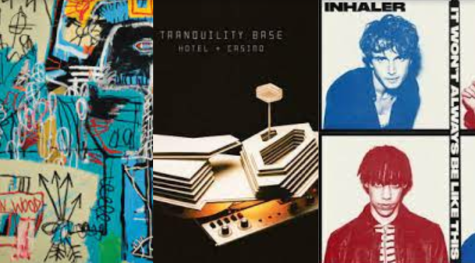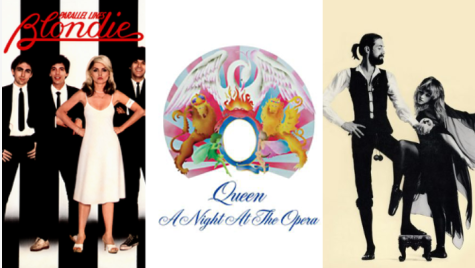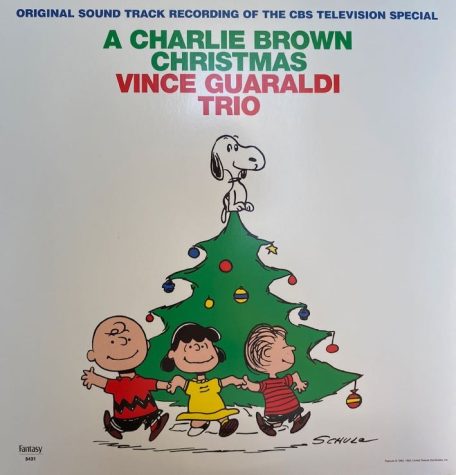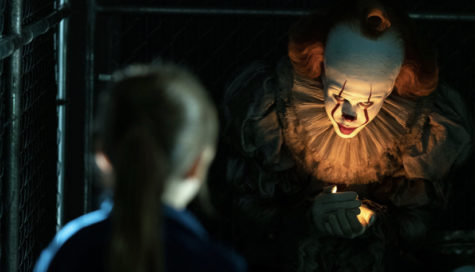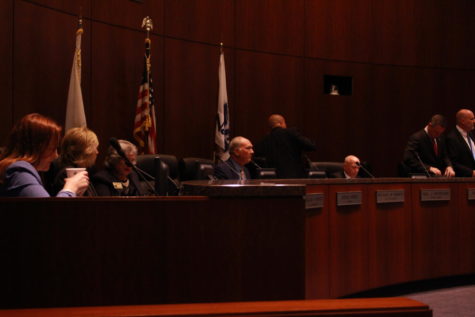Award season is upon us: Recap of Thursday night’s Critics’ Choice Awards
Though the month of January may bring a post-holiday slump, it does signify the start of a different season altogether: the highly anticipated award season. The upcoming Screen Actors Guild Awards, Grammy Awards and Academy Awards present an opportunity for Hollywood’s elite to congregate and, depending on your perspective, celebrate a year of artistry and success, or simply promote each other and themselves in a manner which is far from artistic or applicable to the American people.
Regardless of your stance, a hectic schedule with school and extracurriculars can make it difficult for high school students to keep up with the shows’ nominations. As such, Thursday night’s Critics’ Choice Awards could have easily flew under the radar for Naperville North students. Below is a cheat sheet of the biggest awards of the night, along with a brief description of a selected few and an annotation for each winner. Use it how you will, but remember that with great award show power comes great award show responsibility.
Best Director
Winner: Guillermo del Toro – “The Shape of Water”
Greta Gerwig – “Lady Bird”
Martin McDonagh – “Three Billboards Outside Ebbing, Missouri”
Christopher Nolan – “Dunkirk”
Luca Guadagnino – “Call Me By Your Name”
Jordan Peele – “Get Out”
Steven Spielberg – “The Post”
Best Actress
Winner: Frances McDormand – “Three Billboards Outside Ebbing, Missouri”
Jessica Chastain – “Molly’s Game”
Sally Hawkins – “The Shape of Water”
Margot Robbie – “I, Tonya”
Saoirse Ronan – “Lady Bird”
Meryl Streep – “The Post”
Best Actor
Winner: Gary Oldman – “Darkest Hour”
Timothée Chalamet – “Call Me by Your Name”
James Franco – “The Disaster Artist”
Jake Gyllenhaal – “Stronger”
Tom Hanks – “The Post”
Daniel Kaluuya – “Get Out”
Daniel Day-Lewis – “Phantom Thread”
Best Picture
Winner: “The Shape of Water”
Set against the tumultuous backdrop of Cold War era America, “The Shape of Water” follows Elisa (Sally Hawkins), a mute janitor employed at a government laboratory which one day receives an amphibian-like creature. Gripped by curiosity, Elisa begins to pay visits to the creature on a regular basis, eventually developing a close relationship. “The Shape of Water” relays Elisa’s struggle to extricate the creature from the facility, all while running from the government officials who’d like just the opposite. The film was released in early December, and has grossed $26 million.
“Call Me by Your Name”
Set in the Italian countryside, “Call Me by Your Name” has been hailed as a romance of the most artistic sort. Elio (Timothée Chalamet) and Oliver (Armie Hammer) spend a summer together in mid-1983, and develop feelings for each other that are tested over the course of the year. The film first debuted in late January 2017 at the Sundance Film Festival, and accrued $6.5 million at the box office against a budget of $3.5 million.
“Dunkirk”
Christopher Nolan’s World War II thriller “Dunkirk” was applauded for its visual direction and cinematography. The film follows Tommy (Fionn Whitehead), a British Army private who remains the sole survivor of a German attack in France. Dunkirk follows Tommy’s (and his fellow soldiers’) struggle to return home to the United Kingdom, all against a backdrop of destruction and death. Dunkirk had been lauded for its historical accuracy and simplistic grandeur, and has been hailed as “…the greatest war film ever” by Peter Travers of Rolling Stone.
“The Post”
Following the surge of films based on true stories, “The Post” tells the story of The Washington Post’s publication of the Pentagon Papers, a set of documents which revealed the extent and depth of the United States’ involvement in the Vietnam War. The Post’s publisher, Katharine Graham (Meryl Streep) and editor, Ben Bradlee (Tom Hanks), push against Washington bureaucrats in an attempt to publish the documents and expose a string of corruption. “The Post” has been praised for its relevance to our nation’s current political climate as well as for Streep and Hanks’ respective performances.
“Three Billboards Outside Ebbing, Missouri”
A black comedy/crime film with plot twists and wit reminiscent of films such as “Fargo,” “Three Billboards” tells the story of Mildred Hayes (Frances McDormand), the mother of a young murder victim. Outraged by the community’s lack of attention toward her daughter’s murder, Hayes purchases three billboards just outside of her town of Ebbing, using them to admonish the local sheriff for his inaction. What follows is a dark, saddening, inexplicably comedic look into tragedy and human nature, all of which is exemplified by McDormand’s lauded performance.
“Get Out”
In what is perhaps the most controversial, if not the most talked-about of the Golden Globes nominations, “Get Out” tells the story of Chris (Daniel Kaluuya), a black man who visits the home of his white girlfriend, Rose (Allison Williams). During his stay, Chris notices a string of strange events, beginning with Rose’s parents’ unnerving comments regarding race. Widely regarded as an acute, topical look at American racism, the film’s placement in the ‘Musical and Comedy’ category in the Globes drew widespread anger, with moviegoers feeling that the film’s tense and relevant themes have been, in a twist of irony, disregarded and patronized. Director Jordan Peele (of Key & Peele fame) made light of the film’s placement in the category, chiding on his Twitter account that ‘“Get Out” is a documentary.’ “Get Out” earned $254 million at the box office against a budget of $5 million.
“Lady Bird”
Saoirse Ronan stars in “Lady Bird,” a coming of age tale set in late 2002. Christine ‘Lady Bird’ McPherson (Ronan), a California high school student, has a strained relationship with her parents, leading her to rely on herself for several of her needs. “Lady Bird” explores McPherson’s relationships with her peers and parents over the course of a year, complete with life-like drama, happiness, and surprises. The film’s director Greta Gerwig stated that “Lady Bird” was meant to be the female counterpart to the 2014 film “Boyhood.” “Lady Bird” has been praised for its cinematography and direction, earning an unprecedented 99% approval score on review aggregator Rotten Tomatoes. “Lady Bird” has earned $35 million at the box office against a budget of $10 million.
“The Big Sick”
Kumail Nanjiani’s romantic comedy centers around the true story of Nanjiani’s marriage to his wife, Emily, who suddenly falls ill. Their relationship is further complicated due to the couple’s interracial marriage, which draws scorn from their respective families. The Judd Apatow co-produced film has received its fair share of praise, particularly for its “…appealing leads and cross-cultural themes to prove the standard romcom formula still has some fresh angles left to explore,” according to Rotten Tomatoes (a platform on which the film holds a 98% approval rating). The Big Sick has grossed $55 million against a budget of $5 million.
“Darkest Hour”
Best Actor winner Gary Oldman stars in “Darkest Hour,” a World War II era biopic centered around the career of British Prime Minister Winston Churchill. The film spans Churchill’s beginnings as the First Lord of the Admiralty, a role which required a hefty dose of courage and gumption which served him well over the course of the war. “Darkest Hour” has received mixed reviews, yet has been particularly lauded for Oldman’s performance. The film has been nominated for nine British Academy Film Awards (BAFTA) awards and has won several others, including a Golden Globe award for Gary Oldman’s performance.
“The Florida Project”
Although arguably the least known film of the category’s nomination, “Florida Project” has been compared to films such as “Boyhood” for its strong themes of childhood, independence, and growing up. The film follows six-year-old Moonee (Brooklynn Prince), a young girl who lives in Orlando, Florida with her mother. Moonee is spends much of her day alone in her motel, choosing to pass the time with two friends. Unsupervised and unencumbered, Moonee eventually falls into trouble for setting a building on fire and stealing a set of Walt Disney World tickets. Willem Dafoe and Prince each deliver stunning performances, and the film has been lauded for its “…colorfully empathetic look at an underrepresented part of the population,” according to Rotten Tomatoes.

Tanya is a senior at Naperville North, and can barely wait to get started with a new year for The North Star! As Editorials Editor, Tanya is responsible...



